Related Research Articles
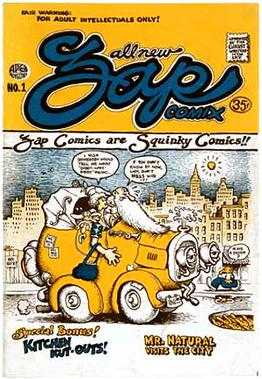
Underground comix are small press or self-published comic books that are often socially relevant or satirical in nature. They differ from mainstream comics in depicting content forbidden to mainstream publications by the Comics Code Authority, including explicit drug use, sexuality, and violence. They were most popular in the United States in the late 1960s and 1970s, and in the United Kingdom in the 1970s.

Zap Comix is an underground comix series which was originally part of the youth counterculture of the late 1960s. While a few small-circulation self-published satirical comic books had been printed prior to this, Zap became the model for the "comix" movement that snowballed after its release. The title itself published 17 issues over a period of 46 years.
Manuel Rodriguez, better known as Spain or Spain Rodriguez, was an American underground cartoonist who created the character Trashman. His experiences on the road with the motorcycle club, the Road Vultures M.C., provided inspiration for his work, as did his left-wing politics. Strongly influenced by 1950s EC Comics illustrator Wally Wood, Spain pushed Wood's sharp, crisp black shadows and hard-edged black outlines into a more simplified, stylized direction. His work also extended the eroticism of Wood's female characters.
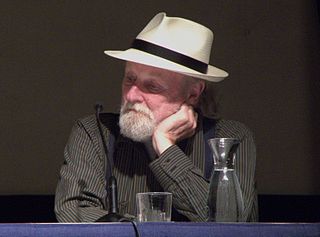
Gilbert Shelton is an American cartoonist and a key member of the underground comix movement. He is the creator of the iconic underground characters The Fabulous Furry Freak Brothers, Fat Freddy's Cat, and Wonder Wart-Hog.
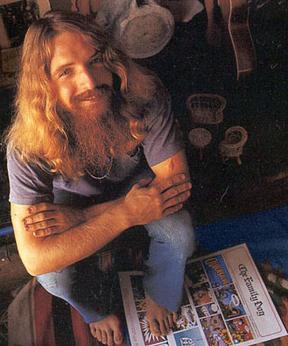
Richard Alden "Rick" Griffin was an American artist and one of the leading designers of psychedelic posters in the 1960s. As a contributor to the underground comix movement, his work appeared regularly in Zap Comix. Griffin was closely identified with the Grateful Dead, designing some of their best-known posters and album covers such as Aoxomoxoa. His work within the surfing subculture included both film posters and his comic strip, Murphy.

Last Gasp is a San Francisco–based book publisher with a lowbrow art and counterculture focus. Owned and operated by Ron Turner, for most of its existence Last Gasp was a publisher, distributor, and wholesaler of underground comix and books of all types.
Steve Clay Wilson was an American underground cartoonist and central figure in the underground comix movement. Wilson attracted attention from readers with aggressively violent and sexually explicit panoramas of lowlife denizens, often depicting the wild escapades of pirates and bikers. He was an early contributor to Zap Comix.

Victor Moscoso is a Spanish–American artist best known for producing psychedelic rock posters, advertisements, and underground comix in San Francisco during the 1960s and 1970s. He was the first of the rock poster artists of the 1960s era with formal academic training and experience. He was the first of the rock poster artists to use photographic collage in many of his posters.
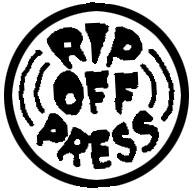
Rip Off Press Inc. is a comic book mail order retailer and distributor, better known as the former publisher of adult-themed series like The Fabulous Furry Freak Brothers and Rip Off Comix, as well as many other seminal publications from the underground comix era. Founded in 1969 in San Francisco by four friends from Austin, Texas — cartoonists Gilbert Shelton and Jack Jackson, and Fred Todd and Dave Moriaty — Rip Off Press is now run in Auburn, California, by Todd.

Mr. Natural is a comic book character created and drawn by 1960s counterculture and underground comix artist Robert Crumb. First appearing in Yarrowstalks (1967), the character gained a following during the emergence of underground comix in the 1960s and 1970s, and has been extensively merchandised in various products.
A comic jam is a creative process where one or more comics artists collaborates on drawing or painting one single comic. Often the process is that one artist creates the first page, and then another artist creates the second, and a third does the next, and so on. There is no script that the artists work from, and the content of the comics is improvised. Any given artist working on a comic jam makes a page based solely on what happened on the previous page. Variations include each artist contributing a single panel, or set of two or three panels, and then passing it on to the next participant. The cartoonists of the seminal underground anthology Zap Comix were known for contributing a jam comic to each issue of Zap from around issue #3 onward.

Angelfood McSpade is a comic book character created and drawn by the 1960s counter culture figure and underground comix artist Robert Crumb. The character first appeared in the Philadelphia-based underground newspaper Yarrowstalks #2 in July 1967, making her comics debut in the second issue of Zap Comix.
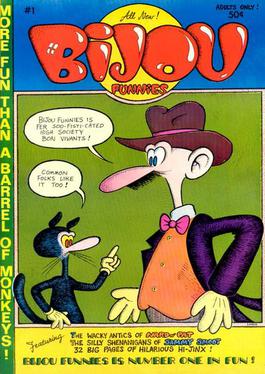
Bijou Funnies was an American underground comix magazine which published eight issues between 1968 and 1973. Edited by Chicago-based cartoonist Jay Lynch, Bijou Funnies featured strong work by the core group of Lynch, Skip Williamson, Robert Crumb, and Jay Kinney, as well as Art Spiegelman, Gilbert Shelton, Justin Green, and Kim Deitch. Bijou Funnies was heavily influenced by Mad magazine, and, along with Zap Comix, is considered one of the titles to launch the underground comix movement.

Donald Richard Donahue was a comic book publisher, operating under the name Apex Novelties, one of the instigators of the underground comix movement in the 1960s.
Gary Edson Arlington was an American retailer, artist, editor, and publisher, who became a key figure in the underground comix movement of the 1960s and 1970s. As owner of one of America's first comic book stores, the San Francisco Comic Book Company, located in San Francisco's Mission District, Arlington's establishment became a focal point for the Bay Area's underground artists. He published comics under the name San Francisco Comic Book Company, as well as publishing and distributing comics under the name Eric Fromm. Cartoonist Robert Crumb has noted, "Gary made a cultural contribution in San Francisco in the late 1960s, through the '70s, '80s & '90s that was more significant than he realizes."
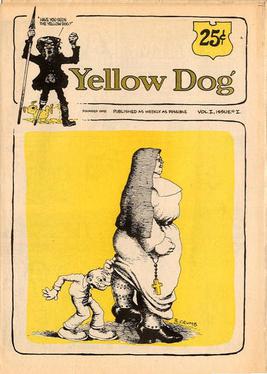
Yellow Dog was an underground comix newspaper and later comic book published by the Print Mint in Berkeley, California. It published 22 issues from 1968 to 1973, featuring many of the period's most notable underground cartoonists, including Robert Crumb, Joel Beck, Robert Williams, Rick Griffin, Greg Irons, and Trina Robbins. Other frequent contributors included Andy Martin, Franz Cilensek, John Thompson, Buckwheat Florida, Jr., Jim Osborne, Ronald Lipking, and Hak Vogrin. The founding editor was Print Mint co-publisher Don Schencker.

San Francisco Comic Book was an underground comix anthology published between 1970 and 1983. Conceived of and edited by Gary Arlington, the anthology highlighted the work of many of San Francisco's top underground talents, including Bill Griffith, Robert Crumb, Kim Deitch, Justin Green, Rory Hayes, Willy Murphy, Jim Osborne, Trina Robbins, and Spain Rodriguez.

Cartoonists Co-op Press was an underground comix publishing cooperative based in San Francisco that operated from 1973 to 1974. It was a self-publishing venture by cartoonists Kim Deitch, Bill Griffith, Jerry Lane, Jay Lynch, Willy Murphy, Diane Noomin, and Art Spiegelman. Cartoonist Justin Green's brother Keith acted as salesman/distributor, and the operation was run out of Griffith's apartment.
Keith Green was an American publisher, distributor, and art dealer. Starting out in the late 1960s as an underground comix distributor, in the early 1970s, he published comics, and by the mid-1970s he had become a New York City art dealer. He was the younger brother of cartoonist Justin Green.
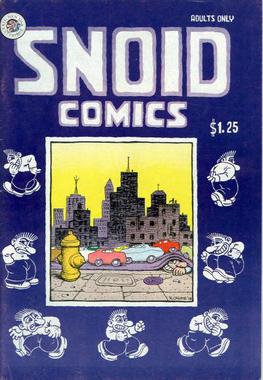
The Snoid, occasionally referred to as Mr. Snoid, is an American underground comix character created by Robert Crumb in the mid-1960s. A diminutive sex fiend and irritating presence, the Snoid often appears with other Crumb characters, particularly Angelfood McSpade, Mr. Natural, and Crumb's own self-caricature.
References
Citations
- ↑ Dalzell, Tom (Feb 20, 2020). "Remembering Alice Schenker, whose Print Mint on Telegraph Avenue sparked the 1960s poster revolution". Berkeleyside.
- ↑ "An Interview with Victor Moscoso". The Comics Journal . No. 246. Interviewed by Groth, Gary. Sep 2002.
- ↑ Estren 1993, p. 50, 250.
- ↑ Fox, M. Steven. "Lenny of Laredo". ComixJoint. Retrieved Nov 24, 2016.
- ↑ Cushing, Lincoln (2011). "San Francisco Bay Area Posters: 1968–1978". In Carlsson, Chris; Elliott, Lisa Ruth (eds.). Ten Years That Shook the City: San Francisco 1968-1978. City Lights Books. p. 287. ISBN 978-1931404129.
- ↑ Elliott 2011, p. 287.
- ↑ Rosenkranz 2002, p. 75.
- 1 2 Estren 1993, p. 54.
- ↑ Estren 1993, p. 250.
- ↑ Fox, M. Steven. "Snatch Comics". ComixJoint. Retrieved Dec 9, 2016.
- 1 2 Dalzell, Tom (Dec 5, 2016). "Photos: The early days of Berkeley's now-gone Print Mint". Berkeleyside.
- ↑ Fox, M. Steven (2013). "Lemme Outa Here! Only Printing / October, 1978 / 36 pages / The Print Mint". ComixJoint. Retrieved Mar 18, 2024.
- ↑ Dropout, Steed (Jan 28, 2016). "Telegraph Avenue's Desolation Row". Berkeley Reporter.
Sources
- Estren, Mark James (1993). A History of Underground Comics (4th ed.). Berkeley: Ronin Publishing. ISBN 978-0914171645.
- Rosenkranz, Patrick (2002). Rebel Visions: The Underground Comix Revolution 1963-1975. Fantagraphics. ISBN 978-1560977063.